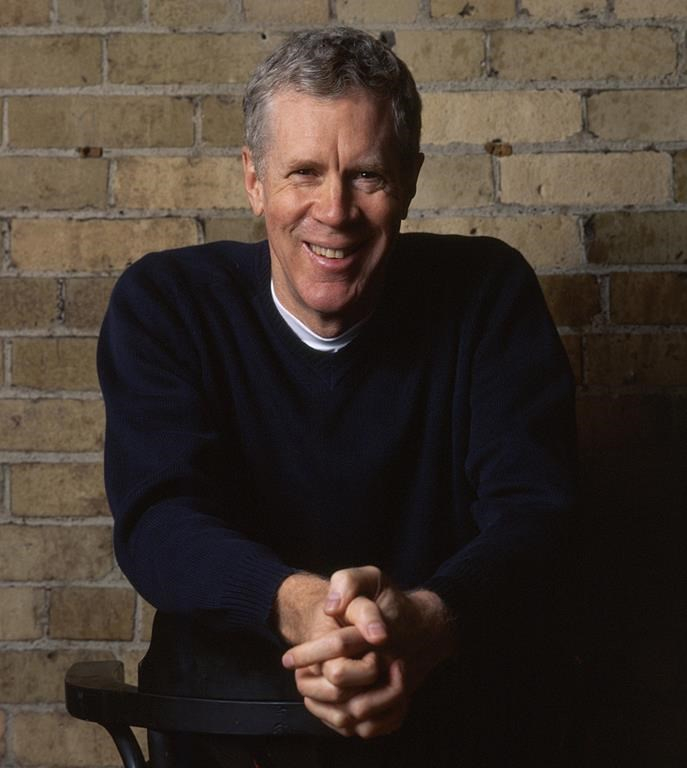Support strong Canadian climate journalism for 2025
Stuart McLean, the bestselling author and soft-spoken humorist whose gentle celebration of life's biggest and smallest moments endeared him to legions of faithful listeners of CBC Radio's "The Vinyl Cafe," has died. He was 68.
CBC said the celebrated storyteller, who had been diagnosed with skin cancer, died Wednesday in Toronto.
Tributes immediately poured in from fellow entertainers, broadcasters and fans who were quick to salute McLean's heartfelt aims to unite Canadians in a way that helped us understand each other, no matter our backgrounds.
Fellow CBC veteran Peter Mansbridge called McLean a master storyteller who helped shape the public broadcaster and reach the country's furthest corners.
"It's a big loss, it's a big loss for us but it's a big loss for the country because he cared about Canada in a very special way and he made us all better by listening to the stories that he told," said Mansbridge, who'd known McLean for more than 30 years.
McLean announced in December he was suspending his long-running program to focus on treatment for melanoma, which he was diagnosed with in late 2015. He said his first round of immunotherapy treatment that winter was not completely successful and he needed to undergo another round this year.
"The Vinyl Cafe" radio show, which featured a mix of stories, essays and musical performances, was spun into bestselling books and became a touring production in 2008. The show's stories centred on Dave, the owner of a second-hand record store, and also featured Dave's wife, Morley, their two children, Sam and Stephanie, and various friends and neighbours.
Mansbridge admitted to many times finding himself riveted by one of McLean's stories in private encounters. The detailed yarns were always relayed in his trademark whisper-like gentle tone that invited the listener to lean in.
"The beauty of Stuart was he really was the same off-air as he was on-air," said "The National" anchor.
"On-air he's a terrific storyteller who could engage the public so easily with the simplest of stories — and he was just the same in real life. I can remember many times when we were together that he'd just start telling stories, it could be a story about something that happened in the news the day before or something at work the day before, but he'd tell it in that magical way that he tells stories and you'd sit there totally involved in the way he told them."
Journalist and academic Vince Carlin first met McLean when they were both climbing the ranks at CBC's news operations in the late 1970s.
After McLean took a job at Ryerson University, he successfully convinced Carlin to make the leap too, for a role as its chairman of the school of journalism.
"He spoke quite quietly, but in a conspiratorial tone of voice," Carlin said.
"He had that charisma — which he could put onto the air as well — to lead you down a path you might've not considered."
"Vinyl Cafe" executive producer Jess Milton remembered a good friend who encouraged people to see the good in each other.
"He connected us to Canada but ... he also connected us to each other," said Milton, who worked with McLean for almost 14 years, including about 75 to 100 live shows a year.
"In a time when people are concentrating on our differences he did the opposite — he shone the light on our similarities and the things we have in common."
Milton said McLean would toil over a carefully crafted tale or turn of phrase to make sure it would hit its mark.
"His favourite thing about performing wasn't the laughter — he loved when the waves crested and there was a fantastic laugh, especially when it was a laugh of surprise — but more than that he loved the moments of silence, those moments when everybody was experiencing the same thing at the same time and they were all with you."
Born Andrew Stuart McLean on April 19, 1948, in Montreal, he attended high school at the city's Lower Canada College, and graduated from Sir George Williams University — now known as Concordia University — in 1971.
McLean made his foray into journalism in the format that years later would help cement his star status: radio. He produced documentaries for CBC Radio's "Sunday Morning."
In 1979, the Alliance of Canadian Cinema, Television and Radio Artists awarded him the best radio documentary prize for contributing to the "Sunday Morning" coverage of the Jonestown massacre in Guyana.
Following that stint, McLean was a regular columnist and guest host on CBC's "Morningside" for seven years. "The Morningside World of Stuart McLean" was a national bestseller.
McLean had been upbeat about his cancer setback and told fans in an online message posted in December that he expected to return to work.
"I don't want you to worry about me. A year ago I told you that I expected this to be just a bump in the road, not the end of the road. I still believe that to be true. I hope we will meet up again — on the radio or in theatres," McLean wrote.
The CBC said a public tribute would be announced at a later date.
McLean was an officer of the Order of Canada, a professor emeritus at Ryerson University, and a three-time winner of the Stephen Leacock Medal for Humour.
McLean is survived by his three sons Christopher, Robert and Andrew, and grandchildren Ramona and Oscar.




Comments